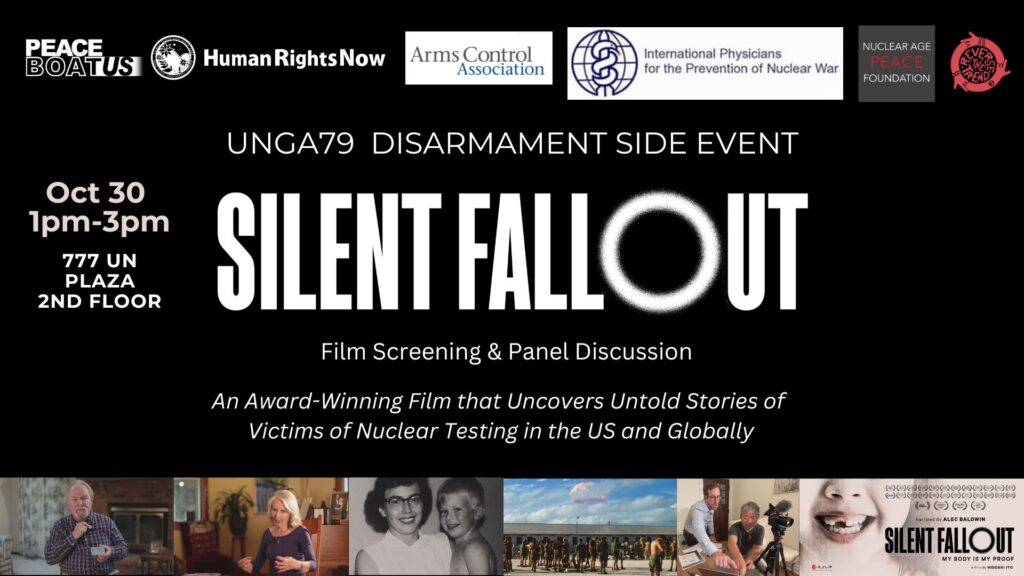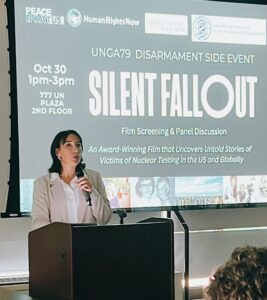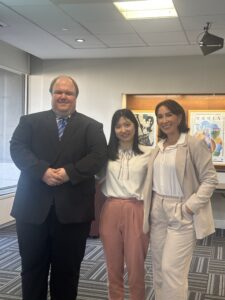“Silent Fallout Film Screening & Panel Discussion”
Co-hosted by: Human Rights Now, Peace Boat US;
Co-sponsored by: International Physicians to Prevent Nuclear War, Arms Control Association, Nuclear Age Peace Foundation, and Reverse the Trend
On October 30, 2024, representatives from international communities, including civil society organizations, permanent missions to the UN in New York, the UN Secretariat, and the International Committee of the Red Cross, joined forces to address pressing issues surrounding the global nuclear test moratorium and disarmament. Key highlights included the long-lasting health impacts of nuclear testing, the ongoing battle over the U.S. Radiation Exposure Compensation Act of 1990 (RECA), and the importance of international obligations under Articles 6 and 7 of the Treaty on the Prohibition of Nuclear Weapons (TPNW) to assist those affected by nuclear testing and use.
Human Rights Now (HRN) had the privilege of screening Silent Fallout, an award-winning documentary directed by Hideaki Ito and narrated by Alec Baldwin, in New York City.
In 1951, with no prior warning, the United States government conducted its first nuclear test on the US mainland (Nevada Test Site), followed by extensive testing in subsequent years across the Pacific Islands (Christmas Island, Bikini Atoll, the Marshall Islands). The nuclear fallout—including radioactive rain and snow—poisoned communities and harmed the health of affected populations. Today, U.S. citizens and people worldwide continue to suffer severe health impacts from these testing programs, with hundreds of thousands developing and dying from cancers.
The film highlights the “Baby Tooth Survey,” conducted in 1958 in St. Louis, Missouri, led by Dr. Louise and Eric Reiss. They analyzed over 61,000 baby teeth to measure radiation exposure of strontium-90 in children due to contaminated milk. Although the project faced accusations of being communist, it played a pivotal role in influencing Congress and ultimately led U.S. President John F. Kennedy to implement the 1963 Limited Test Ban Treaty, which banned nuclear testing in the atmosphere, outer space, and underwater.
“I feel strong anger. A government that has exposed its own citizens to radiation and acquired nuclear weapons. The perpetrators remain silent. Why do the victims have to lose their voices? And should people remain ignorant? Should we just be bystanders? Who are nuclear weapons for? I believe my role is to take the first step and get people to sit down at the discussion table.”[1] -Hideaki Ito
Key highlights:
Opening Address by Ms. Larissa M. Truchan, HRN’s Youth Representative, highlighted the unique role of the younger generation in carrying forward the disarmament mission. Ms. Truchan shared the stories of Hibakusha, survivors from nuclear attacks and tests worldwide, emphasizing HRN’s stance for the total elimination of nuclear weapons and comprehensive compensation for all victims.
Panel Insights:
Ms. Shizuka Kuramitsu, Research Assistant at the Arms Control Association, gave a brief overview and update on the ongoing efforts to extend and expand the 1990 Radiation Exposure Compensation Act. Ms. Kuramitsu emphasized that compensation remains limited and inaccessible for victims both inside and outside the U.S. In the U.S., not everyone affected by the tests and the radiation associated are covered. Even being covered, the small, one-time RECA benefit payment falls short of addressing the lifelong health and social consequences of radiation exposure. The dispute over compensation remains unsettled all over the world. For instance, the government of Japan has not provided an adequate compensation and acknowledgement to Japanese fishermen exposed to radiation from Pacific nuclear tests.
For the RECA recent update, after several extension since 1990, it expired in June 2024. The U.S. Senate passed a bill in March 2024, which would have reauthorized the RECA program to extend for 6 years and expand partial compensation to communities that have been excluded, however, no action has been taken at the House.
While experts estimate that the RECA renewal would cost additional funding of the $5 billion, opponents to the renewal argue that it is too costly, despite this amount being minimal compared to the cost of nuclear weapons development (projected at $756 billion over the next decade). [2]
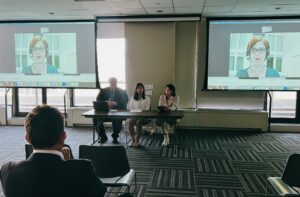 Ms. Juli Hauschulz, Campaigner for “To Survive is to Resist” at the German affiliate of the International Physicians for the Prevention of Nuclear War (IPPNW), spoke to the audience directly from Berlin. Radiation exposure can impact health in various ways, including through ingestion, inhalation, medical procedures, and background radiation. Ionizing radiation generates free radicals, leading to genetic and chromosomal damage. If these damages are not repaired, they will be passed down genetically (potentially up to 15 generations), causing cancer and other diseases that may metastasize. Radiation risk is dose-dependent, with higher doses leading to greater health risks. Children are particularly vulnerable due to rapid cell growth and division, as well as a reduced capacity for cellular repair compared to adults, with women and girls also facing greater risks. Tragically, these impacts are irreversible. The United Nations has resolved to investigate how these effects occur and to support scientific research on radiation’s impacts. A more robust healthcare system is essential to address the needs of cancer patients and radiation-affected individuals. Timely diagnosis and treatment are crucial, particularly for vulnerable groups, including pregnant women, who face heightened risks for both cancer and cardiovascular disease due to radiation exposure.
Ms. Juli Hauschulz, Campaigner for “To Survive is to Resist” at the German affiliate of the International Physicians for the Prevention of Nuclear War (IPPNW), spoke to the audience directly from Berlin. Radiation exposure can impact health in various ways, including through ingestion, inhalation, medical procedures, and background radiation. Ionizing radiation generates free radicals, leading to genetic and chromosomal damage. If these damages are not repaired, they will be passed down genetically (potentially up to 15 generations), causing cancer and other diseases that may metastasize. Radiation risk is dose-dependent, with higher doses leading to greater health risks. Children are particularly vulnerable due to rapid cell growth and division, as well as a reduced capacity for cellular repair compared to adults, with women and girls also facing greater risks. Tragically, these impacts are irreversible. The United Nations has resolved to investigate how these effects occur and to support scientific research on radiation’s impacts. A more robust healthcare system is essential to address the needs of cancer patients and radiation-affected individuals. Timely diagnosis and treatment are crucial, particularly for vulnerable groups, including pregnant women, who face heightened risks for both cancer and cardiovascular disease due to radiation exposure.
Mr. Christian N. Ciobanu, Policy and Advocacy Director of the Nuclear Age Peace Foundation, Project Coordinator for Reverse the Trend: Save Our People, Save Our Planet, TPNW Advisor for the Mission of Kiribati, emphasized the importance of the Treaty in assisting victims and addressing contaminated environments. He provided insights on Articles 6 and 7 of the TPNW, which serve as a framework for States parties to assist victims and cooperate on environmental remediation. States parties are currently discussing whether a proposed trust fund could accept contributions from both TPNW and non-TPNW states, although States parties and signatories will probably be eligible. Currently, Kazakhstan and Kiribati, and possibly Algeria, may be able eligible to receive funding.
Mr. Ciobanu also raised critical questions about the TPNW’s application, which does not address impacts to non-States parties and victims living outside the jurisdiction of States parties. He stressed the need for further advocacy from grassroots organizations and NGOs to bridge these gaps and support victims.
Audience reflections included profound expressions of gratitude and deep emotions as the film shed light on the realities of nuclear testing, with some moved to tears and one attendee recalled childhood memories of growing up in Guam during heavy testing. Participants appreciated the film’s scientific insights and felt inspired to continue working toward a world free of nuclear weapons.
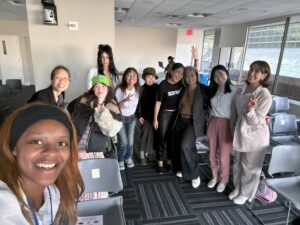 HRN thanks everyone for being part of this important event. The road to nuclear disarmament is a long and tough one, but we hope that more people will realize the inhumanity and immorality of nuclear weapons and stand up for their total abolition.
HRN thanks everyone for being part of this important event. The road to nuclear disarmament is a long and tough one, but we hope that more people will realize the inhumanity and immorality of nuclear weapons and stand up for their total abolition.
The Silent Fallout Project team invites screening interest and collaborations on peace initiatives. For further details, please contact Shiho Burke at burkeshiho@gmail.com and Sachiko Asano at sachi.com@goldensachi.com.
References:
[1] Statement by Director Hideaki Ito, 2 July 2024. https://www.globenewswire.com/news-release/2024/07/02/2907457/0/en/Silent-Fallout-Groundbreaking-Film-Tour-Uncovers-Nuclear-Testing-Secrets.html
[2] See: https://www.armscontrol.org/remarks-closing-door-nuclear-testing-honor-past-generations. See also: https://www.armscontrol.org/act/2024-10/focus/congress-must-expand-support-downwinders and https://thehill.com/opinion/healthcare/4700668-congress-must-act-now-to-help-americans-still-suffering-from-the-legacy-of-nuclear-tests/




